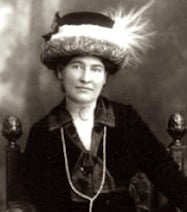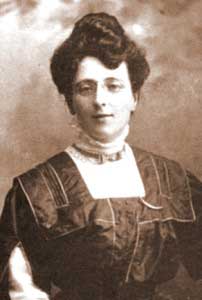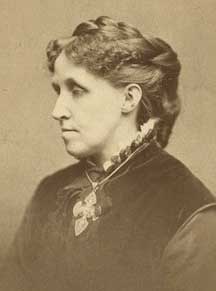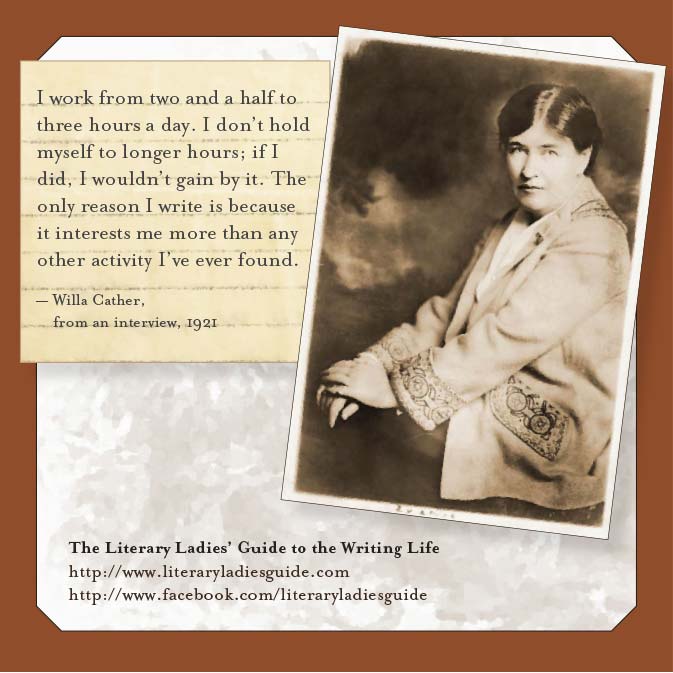How to Find Time to Write: Advice from Classic Authors
By Nava Atlas | On January 6, 2015 | Updated September 16, 2022 | Comments (0)

In Thunder and Lightening: Cracking Open the Writer’s Craft, Natalie Goldberg offers advice on how to find time to write. She suggests structuring your time — strictly! Be precise, set your writing time up in advance, and take that time commitment seriously:
“Open those date books that Americans are so fond of and schedule in writing time, and be realistic. If you have a busy week, don’t beat yourself up for not being able to write every day. As a matter of fact, don’t ever say you’ll write every day because when you don’t — and I promise you, there will be days you won’t — you’ll hate yourself.
Beware of sweeping commitments: they usually have the opposite effect. Rather than writing every day, you’ll write no days. Instead, be pragmatic: look at your calendar. If next week you can fit in only a half hour for writing on Tuesday from ten to ten-thirty in the morning, good. Mark it down. Do you have another window of time? For how long? Be specific, jot it down: four to five-thirty Friday.
Let’s push it further — where will you write? At the Blue Moon Café? OK, you’ve made a date, and like any other — with the dentist, the accountant, the hairdresser — you have to keep it. You’re committed, it’s in your appointment book.”
Finding time to write has always been a concern, especially for women, who traditionally raised the kids, kept the house, and cared for aging parents. And sometimes, wrote to pay the bills before they allowed themselves to write for self-expression.
Some, like Willa Cather, sidestepped domestic duties. But no matter the circumstances, finding time to write has always been a dilemma shared by writers past and present. Here are how a few of our Literary Ladies tackled the issue:
Louisa May Alcott: “Chained to my galley”
“I used to write from morning till night without fatigue when ‘the steam was up.’” Now, however, I am paying the penalty of twenty years of over work, & can write but two hours a day, doing about twenty pages, sometimes more, though my right thumb is useless from writer’s cramp.” (Louisa May Alcott, from a letter, 1887)
Alcott, on the other hand, was less than happy with her curtailed work days. Though she complained of being “chained to my galley,” she liked to spend many hours writing.. Maybe there will be times in your life when, as Alcott described it, “the steam is up.”
That usually means it’s time to take a breather and let the well fill up again. But whether your writing schedule is constrained voluntarily or by circumstances, much can be accomplished, so long as whatever time you have is spent diligently and, if at all possible, joyfully.
. . . . . . . . . . .
See also: Sweet Success at Last for Louisa May Alcott
. . . . . . . . . . .
Willa Cather: “I don’t hold myself to longer hours”
In a 1921 interview in The Bookman, which took place in her New York City home, far from the Nebraska prairies that inspired her early classics, Willa Cather’s work schedule was described this way:
“Miss Cather works but three hours a day — hours of perfect joy and happiness, she describes them. She finds that at the end of two or three hours she has exhausted her best efforts. She spends the remainder of the day with her friends, or taking a walk in Central Park, or listening to good music …
She believes that a writer should keep in as good physical condition as a singer, and so she regulates her life on a simple, normal schedule. She writes easily and seldom tears a paragraph or a page to pieces.”
Would that we could all enjoy such a schedule—and free of angst! However, most of us are lucky if, after two or three hours, we’ve written more than a few paragraphs that upon subsequent inspection don’t read like sheer drivel. Let’s not forget that prior to this interview Cather had already published four of her major novels, and those, after her long apprenticeship as a journalist.
. . . . . . . . . . .
5 Pieces of Writing Wisdom from Willa Cather
. . . . . . . . . . .
In Cather’s own words:
“I work from two and a half to three hours a day. I don’t hold myself to longer hours; if I did, I wouldn’t gain by it. The only reason I write is because it interests me more than any other activity I’ve ever found. I like riding, going to operas and concerts, travel in the west; but on the whole writing interests me more than anything else. If I made a chore of it, my enthusiasm would die.
I make it an adventure every day. I get more entertainment from it than any I could buy, except the privilege of hearing a few great musicians and singers. To listen to them interests me as much as a good morning’s work.
For me, the morning is the best time to write. During the other hours of the day I attend to my housekeeping, take walks in Central Park, go to concerts, and see something of my friends. I try to keep myself fit, fresh: one has to be in as good form to write as to sing. When not working, I shut work from my mind.”
When Willa Cather sat down to write for two to three hours, she had already become a seasoned writer. Despite this leisurely schedule, Cather wrote ten more novels, plus many essays and short stories, in the years that followed this interview.
. . . . . . . . .

You might also like: L.M. Montgomery, Writing, and Motherhood
. . . . . . . . .
L.M. Montgomery: A multi-tasker, like most women
L.M. Montgomery spent few hours at her desk, but worked all the time in her mind, unlike Cather, who left her work at her desk. When she was young and compelled to make a living working at a newspaper, she observed that she didn’t solitude to write, but could find times in the precious down time during her day job:
“… Now, it used to be at home, that I thought undisturbed solitude was necessary that the fire of genius might burn. I must be alone and the room must be quiet. It would have been the last thing to enter my imagination to supposed that I could ever write anything at all, much less anything of value, in a newspaper office, with rolls of proof shooting down every few minutes, people coming and going and conversing, telephones ringing and machines thumping and dragging overhead.”
But write she did:
“Every morning here I write and not bad stuff either. I have grown accustomed to stopping in the midst of a paragraph to interview a prowling caller and to pausing in full career after an elusive rhyme to read a batch of proof and snarled-up copy.”
She also had a mental technique she called “brooding up” a story. “I write fast,” she explained, “having thought out plot and dialogue while I go about my household work. I only do three hours’ literary work a day—two hours’ writing and one typewriting.” (from a letter, 1909)
Not enough time to write is certainly preferable to no time at all. Find even a regular hour or two several times a week and those pages will add up!


Leave a Reply